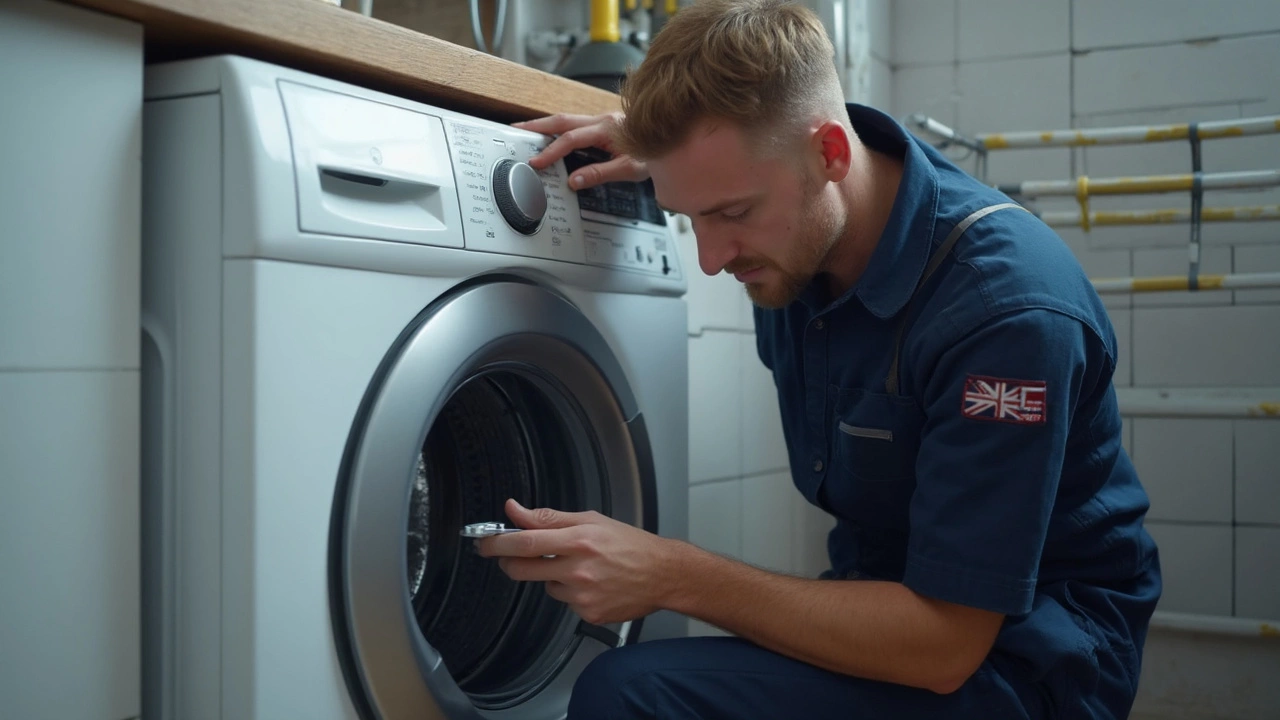Ever had your washing machine quit on you mid-cycle, leaving wet laundry to stew in soapy water? Or maybe your fridge started making noises that sound suspiciously like a tiny engine revving up for takeoff. These moments remind us just how much we rely on our home appliances, and few people stop to think what 'appliance service' actually means—until they're stuck with a stubborn oven on pizza night.
The Real Definition of Appliance Service
When people say 'appliance service,' they're not tossing out a generic phrase. Appliance service covers every little thing that keeps your machines running—diagnosis, regular tune-ups, emergency repairs, and sometimes even full-on replacements. Think of it as a health check-up for your gadgets at home. The real heart of appliance service is catching small problems before they blow up into wallet-busting disasters. A study from the U.S. Department of Energy found that appliances which get regular servicing are up to 30% more energy efficient and last up to 50% longer than neglected ones.
The services themselves run a wide range: checking for worn belts in your dryer, unclogging lint traps, testing fridge thermostats, replacing burnt-out oven elements, or even re-upping seals on your dishwasher’s door. Reputable appliance service pros keep their eyes peeled for anything that can snowball into a bigger problem, like gas leaks in stoves or fraying power cords on microwaves.
But here's the thing—service isn't just a quick fix. It’s proactive care. The difference between someone breaking out a toolbox for a screaming freezer and a pro coming in twice a year to tune up all your kitchen gear is night and day. When you look at the big picture, service stretches from basic tweaks (like lubricating moving parts in a washer) to deeper repairs (swapping out a broken compressor in a fridge or recalibrating the heat sensors in your stove).
Brands and appliance makers almost always recommend service. Top players like Whirlpool, Samsung, GE, and Bosch have their own lists on how often you should bring in a tech, based on the appliance type and your usage. It isn't a plot to vacuum out your bank account—manufacturers know their products run longer and safer with scheduled service. That’s why a lot of new-appliance warranties actually require regular service visits, with proof, or else you risk losing coverage if something fails.
In a nutshell: If you’ve ever wondered what keeps homes humming quietly in the background, it’s appliance service. It's the safety net you don't see until you really need it. The why behind a cooled drink on a summer day—without a sudden panic trip to dump spoiled groceries.
Why Appliance Service Matters (More Than You Think)
Ask anyone who's shelled out hundreds on emergency repairs—routine servicing, and that phrase ‘appliance service,’ suddenly looks like the world’s best insurance policy. Take your fridge as a simple example. If the coils get coated in dust and grime, the compressor works harder, guzzling way more power, and eventually croaking before its time. Now multiply that by every appliance in your home: dishwasher, washing machine, cooktop, even the simple toaster.
Data from the National Association of Home Builders puts the average lifespan of a refrigerator around 13 years, but reports from consumer watchdogs like Consumer Reports show that regularly serviced fridges often coast closer to 18-20 years. Dryers last build up lint, which isn't just a fire hazard—over 2,900 home fires a year in the U.S. are blamed on this. Regular appliance servicing isn’t just saving you cash on replacements, but could literally keep you and your family safe.
Beyond safety, think of energy costs. Appliances running with clogged parts, bad gaskets, or dry bearings suck up extra energy. The Energy Star program highlights how a neglected dryer can draw up to 75% more electricity than a serviced one. That’s money out of your pocket every month.
There’s also the nuisance factor. The worst time for a stove to die is right before dinner with friends. The worst time for a water heater to tank is during a freezing shower. Servicing makes sure these don’t happen at the most inconvenient moments.
Here’s a quick stat-packed table—check out how regular service impacts common home appliances:
| Appliance | Usual Lifespan (years) | With Regular Service (years) | Risk of Major Failure Drops (%) |
|---|---|---|---|
| Fridge | 13 | 18-20 | 41 |
| Washing Machine | 10 | 14-16 | 38 |
| Dishwasher | 8 | 12-14 | 33 |
| Dryer | 10 | 15 | 50 |
Looking at the numbers, skipping on appliance service is like skipping out on oil changes in your car. Sure, you might get away with it for a while, but eventually you’ll feel the pain—in performance, bills, or emergency calls.

What Does a Standard Appliance Service Include?
Appliance service is not just about checking whether your microwave still pops popcorn. A proper service call takes care of so many details that most of us never notice. Let’s break down what an appliance tech actually does during a standard visit.
- Visual Inspection: Looking for signs of wear, rust, frayed wires, leaks or build-up of dirt and debris. Something seemingly tiny, like a crack in a fridge’s door seal, can wreck energy efficiency.
- Testing Components: Techs try out buttons, dials, thermostats, and timers. For electric appliances, they use meters to check voltage, current, and continuity.
- Cleaning: They might clean condenser coils on fridges, clear lint out of dryer vents, or remove soap buildup from washing machines. Dirt in the wrong spot screws up performance and can cause breakdowns.
- Lubrication: Moving parts in washers or dryers need regular oiling or greasing to prevent early wear.
- Calibrating and Adjusting: Oven temps wander if not recalibrated. Washing machines can lose balance. Dishwashers start hitting a ‘meh’ level on drying if their settings aren’t tuned.
- Testing for Leaks: Any appliance with water or gas lines should be checked for leaks every single time—think dishwashers, gas stoves, fridges with ice makers.
- Replacing Worn Parts: Those little plastic parts in your washer, dishwasher’s filter, fridge light bulbs—if they’re about to go, techs usually swap them out before they spark a problem.
Some service contracts also offer emergency visits, phone support, and even discounts on future repairs if you sign up for a regular plan. If you’ve got higher-end gear from brands like Miele or LG, service contracts can include firmware upgrades or specialty cleanings that help keep smart appliances running like new.
Another interesting trend—remote diagnostics. A lot of new machines ‘talk’ to service techs by uploading error codes. This can catch things even before you notice a problem yourself. Plus, you’re saved that “can you describe the noise?” song and dance on the phone.
If you’re thinking about skipping regular service, weigh the small fee against the whopping bill if a repair or replacement is needed. Even a yearly checkup can be all it takes to dodge a five-figure kitchen remodel because of a cascading failure.
When Should You Call for Appliance Service?
Look, nobody wakes up excited to book an appointment for the fridge. But knowing when to make that call makes a world of difference in peace of mind—and in your wallet. Here are some clear signs and advice from top appliance repair companies:
- Your appliance is noisier than normal (banging, rattling, constant running—none of this is good).
- You notice it running hotter, longer, or cycling on and off too quickly.
- Unusual smells, whether musty, burning, or chemical.
- Water is leaking, pooling, or there’s unexplained dampness nearby.
- Appliance isn’t performing as well—clothes still damp, food spoiling, dishes coming out unclean.
- Circuit breakers keep tripping when a machine runs.
- You see error codes, flashing lights, or blinking displays you don’t recognize.
Industry experts say that seasonal changes are often the best time for a checkup. Many people book fridge and freezer servicing before the peak of summer, washer and dryer checks in spring or fall (to clean out winter grime or prep for heavy summer use), and oven/range reviews in late summer, before holidays rack up baking hours.
The golden rule: If an appliance is out of warranty and over five years old, semi-annual servicing is smart. For newer or premium appliances, stick to the schedule in the owner’s manual—usually once a year for most machines. Always save reports or receipts, both for warranties and for resale value if you sell your home (proof of regular service can bump up appliance value in a deal).

Getting the Most Out of Your Appliance Service
Now you know what appliance service covers and why it matters, but how do you make it work for you? First, only use certified professionals, preferably ones specialized for your brand. Modern appliances are complex, so hiring someone reputable keeps you from turning a minor issue into a full-blown headache.
Don’t be afraid to ask questions. A good tech will walk you through what was checked, what looks good, what’s starting to wear, and what you can do to keep everything running between visits. For example, they’ll show you how often to replace filters or clean coils yourself, and point out odd smells or noises to watch for.
If you’re juggling a bunch of warranties or contracts, keep all that paperwork in a safe spot. Many companies let you transfer service plans to new owners if you move—potentially making your home more appealing to buyers.
And here’s a bit of wisdom: the best time to lock in regular service is often when you buy the appliance, not after the first thing goes wrong. New owners usually get better deals on annual packages or extended coverage. The data says machines covered by long-term service contracts are far less likely to need emergency repairs before year 10 than those with only reactive fixes.
You don’t need to become a technical expert, but going through a simple appliance service checklist every few months—checking for dust buildup, odd smells, or leaks—puts you ahead of the game. There are free printable maintenance charts online for nearly every appliance.
Lastly, if you’ve had a decent service tech visit, hang on to their contact info. Building a relationship with someone who knows your machines can save you in a pinch, and most techs are happy to do phone consults before making a trip out. A little know-how, a trustworthy pro, and sticking to a service schedule—that’s the secret sauce to getting the maximum life, value, and peace of mind from the gear you rely on every day.





